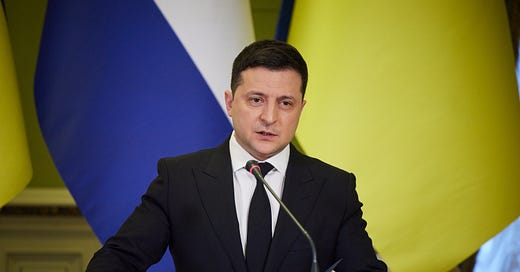The Minsk Agreements Tried to Create Peace Between Ukraine and Russia. Zelensky Said He Never Planned to Honor Them.
The Ukrainian president also accused the West of being insufficiently supportive of Ukraine, despite billions of dollars in aid committed before and after Russia invaded last year.
The Alley of Angels is a memorial nestled amid trees and winding gray stone walkways in Donetsk. Visitors are greeted by an arch that features roses forged from fragments of mines and grenades interwoven with ammunition casings, representing some of the weapons that have taken the lives of children during the Donbas War in the eastern part of Ukraine.
The site was built in 2015, the year after a color revolution fomented regime change in the country, triggering clashes between government forces and separatists in the Donbas who declared independence from Kiev. It was the proxy war before the proxy war, with U.S.-backed troops battling Russian-backed forces. Fighting there had already killed at least 14,000 people before President Vladimir Putin took Russia across the Rubicon last February.
There were efforts to establish a ceasefire and, ultimately, peace in 2014 and 2015. These were the Minsk agreements, mediated with help from Germany and France. But in an interview with Der Spiegel published on Feb. 9, Ukrainian President Volodymyr Zelensky said he never planned to honor the accords, although he was elected president on the promise of ending the Donbas War. He also accused the West of being insufficiently supportive of Ukraine, despite billions of dollars in aid and matériel committed before and after Russia invaded last year.
Until now, the Western narrative around the Minsk accords placed their failure entirely on the shoulders of Russia. But Zelensky’s admission that he did not intend to make the agreements work complicates that telling. This revelation follows two reports that have also undermined the story the public has been sold about the war in Ukraine.
First, according to investigative journalist Seymour Hersh, the U.S. government destroyed the Nord Stream pipelines. Second, former Israeli Prime Minister Naftali Bennett said the U.S.-led West killed a Russia-Ukraine peace deal last March, just after the war began. Now, Zelensky has said that he wrote off the Minsk agreements because “they wanted to appease Russia’s appetite a little at the expense of Ukraine.”
No doubt that line elicited clapping from the trained seals of liberal internationalism. But the implications of it are problematic for the narrators of Western moral superiority because there are only a few conclusions to be drawn, none good. As The Washington Post reported on Feb. 23, 2022, France and Germany, in particular, “pressed for implementation” of the “Minsk peace accords as the best chance for a diplomatic solution” in a last-ditch effort to avoid war. Zelensky has suggested he deliberately sabotaged that effort. But why?
On the one hand, it’s possible Zelensky simply lied to Der Spiegel to save face after Bennett’s revelations humiliated him. Among other things, Bennett said Zelensky was deeply worried about Putin killing him and that after the Russian president promised to spare him for the sake of diplomacy, Zelensky became more confident about appearing in public. The interview with Der Spiegel immediately followed Bennett disclosing that information, which Zelensky dismissed as “funny.”
On the other hand, it’s possible Zelensky really didn’t want to make the Minsk agreements work, perhaps to lure the Kremlin into an attack that he hoped would provoke direct action from the West. Interestingly enough, Oleksiy Arestovych, now-former advisor to Zelensky’s chief of staff, said in 2019 that “a big war with Russia and joining NATO on the basis of victory over Russia” was his preferred path forward. It is also worth noting former German Chancellor Angela Merkel told Die Zeit in December that the “2014 Minsk agreement was an attempt to give Ukraine time.”
“It also used this time to become stronger, as you can see today,” she added. But to make things still murkier, Zelensky said to Der Spiegel that he confided to Merkel after becoming president that he would not implement the agreements. Did that change her mind, or was she always being duplicitous about the purpose of the ceasefire? It’s hard to know.
Here is a summary of the what and why behind the accords via the Post:
Minsk 1, reached in September 2014, had 12 points, including a cease-fire to be monitored by the Organization for Security and Co-operation in Europe, a law on Ukraine’s “decentralization” with temporary special status for the separatist-held territory, local elections, an amnesty and other issues. As fighting continued, a follow-up memorandum two weeks later required heavy weapons to be pulled back from the front lines. The truce again struggled to hold amid disputes over sequencing and finally collapsed in January 2015. Minsk II followed a month later.
Maps of ceasefire violations recorded by the Organization for Security and Co-operation in Europe shows a majority of explosions on Feb. 14, Feb. 15, Feb. 16, Feb. 17, Feb. 18, Feb. 19-20, and Feb. 21 occurring on separatist-controlled territory, indicating Ukraine had been flagrantly violating the ceasefire with shelling up until the war started on Feb. 24.
Keep reading with a 7-day free trial
Subscribe to Contra to keep reading this post and get 7 days of free access to the full post archives.





